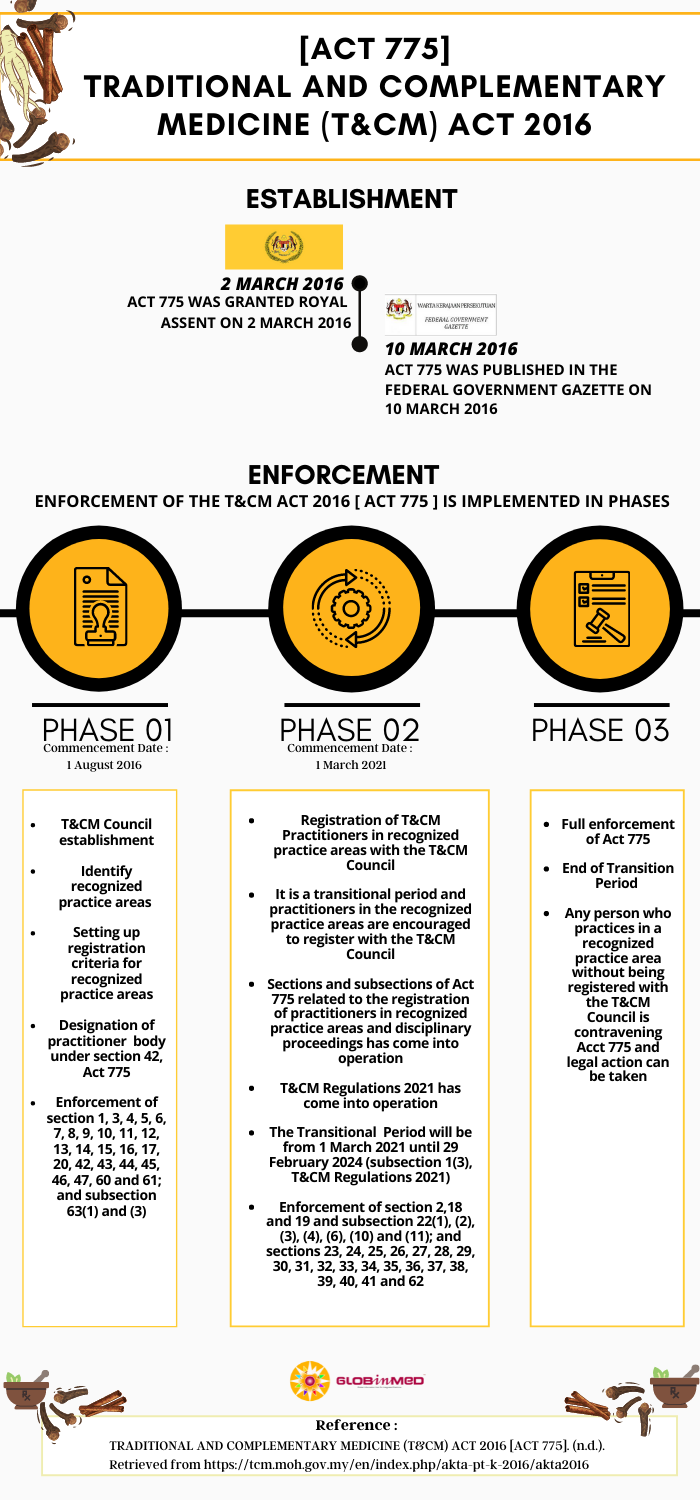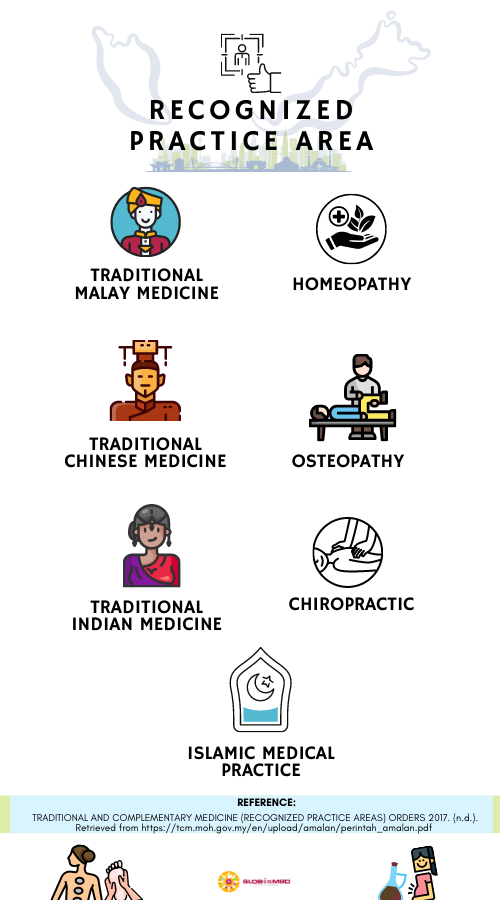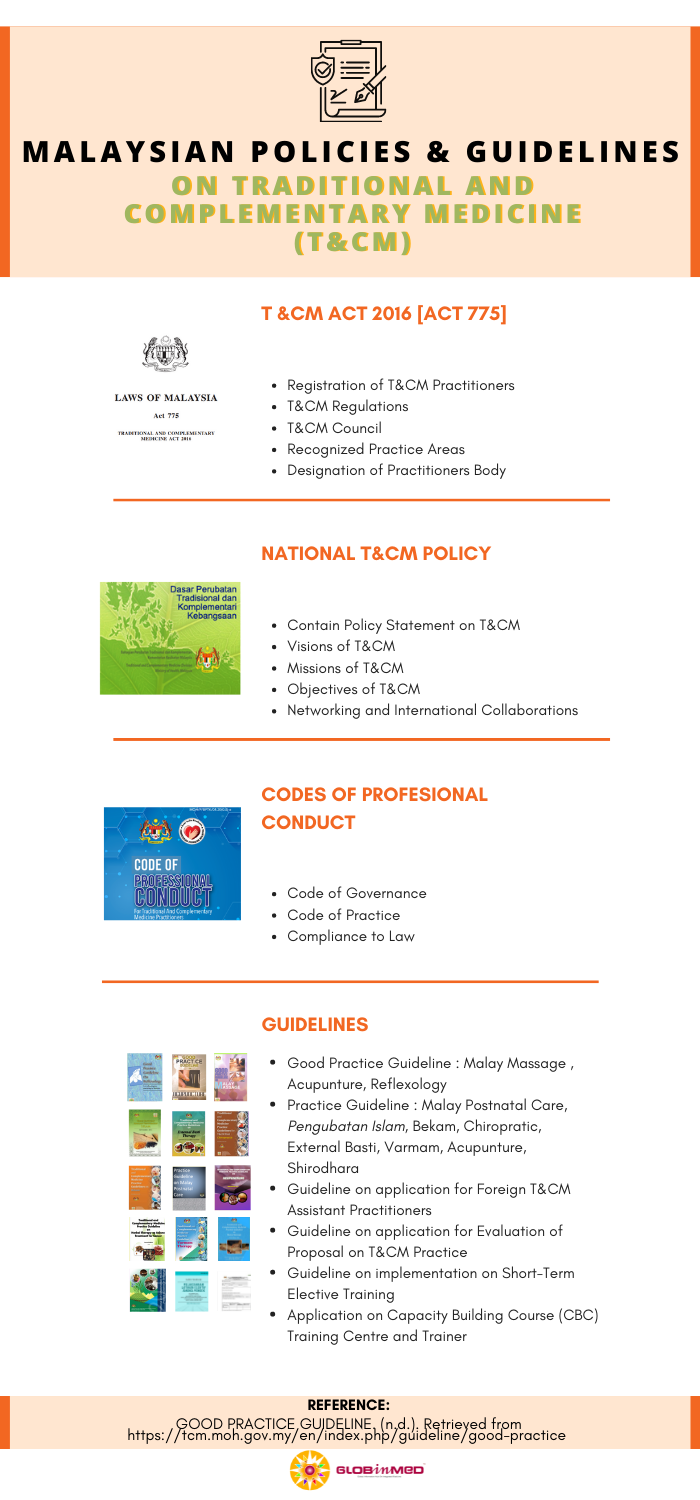THE START OF THE TRADITIONAL & COMPLEMENTARY MEDICINE (T&CM) ACT IN MALAYSIA

Multiculturalism of Malaysia results in a diverse comprehension, utilization, and application of traditional, complementary and alternative medicine.
The “traditional, complementary, alternative medicine” phrases and terms then were standardize, merging into one scope and named as Traditional & Complementary Medicine (T&CM).
Despite the difference in origins and practice, overall, T&CM practice by each ethnic and culture shares similar objectives, which aims for disease prevention and maintenance of general well-being.
In T&CM, numerous researches have been conducted especially in the countries of origin of recognized practice areas such as Chinese medicine, Indian medicine or chiropractic.
To address evidence-based medicine-practice in T&CM, a national directive platform and regulation was established in August 2016.
Parallel, the Ministry of Health (MOH) Malaysia actively encourages the application of evidence-based medicine in all health-related practice in Malaysia, including in T&CM.
The national regulation was established to recognize and legalize T&CM practice, materials, methodology used, to govern practitioners, and to establish connection towards better assessment of public health risk stratification and intervention.
Following suit, an act which governs T&CM practice and practitioners in Malaysia, was gazetted on 10 March 2016 and enforced on 1 August 2016. Act 775 was granted Royal Assent on 2 March 2016 and was published in the Federal Government Gazette on 10 March 2016.
Officially on 1 August 2016, sections 1, 3, 4, 5, 6, 7, 8, 9, 10, 11, 12, 13, 14, 15, 16, 17, 20, 42, 43, 44, 45, 46, 47, 60 and 61 and subsections 63 (1) and (3) of The Traditional and Complementary Medicine (T&CM) Act 2016 (Act 775) came into operation.
In conjunction to Act 775, a council named “Traditional and Complementary Medicine Council (T&CM Council)” is established as a legislative body that act as an executor and reinforcer for T&CM policy, referring to Act 775.
This T&CM council is a platform to channel and connect the voices between the qualified practitioners, services, the recipient/user/patient of the T&CM practitioners, and the health ministry. The functions of T&CM council include registration of eligible T&CM services and practitioner, development of penalties for misconduct practitioner, and processing complaints of the recipient/user of T&CM services.
RECOGNIZED PRACTICE AREA
Every country may have different recognized T&CM practice areas, based on available resources and individual beliefs. These T&CM Practice Areas was gazetted on 28 July 2017 and comes in operation on 1 August 2017. The Ministry of Health Malaysia has seven specified recognized T&CM practice areas:

[CLICK ANY HIGHLIGHTED KEYWORDS TO VIEW THE DOCUMENT]
- Traditional Malay Medicine
Guidelines provided by Ministry of Health Malaysia: Malay Postnatal Care, Bekam, Malay Massage
2. Traditional Chinese Medicine
Guideline provided by Ministry of Health Malaysia: Acupuncture
3. Traditional Indian Medicine
Guidelines provided by Ministry of Health Malaysia: External Basti, Varmam, Shirodhara
4. Homeopathy
5. Chiropractic
6. Osteopathy
7. Islamic Medical Practice (Guideline provided by Ministry of Health Malaysia)
POLICIES

Act 775 (The Traditional and Complementary Medicine (T&CM) Act 2016) is a federal law to provide for the establishment of the T&CM Council to regulate the T&CM services in Malaysia and to provide for matters connected therewith.
Following Act 775 that was gazetted in 10 March 2016, Phase 1 was enforced on 1 August 2016. Phase 2 was enforced on 1 March 2021 after being gazetted on 23 February 2021.
Along the way, policy, regulations and guidelines were published for public references and are openly available.
[CLICK ANY HIGHLIGHTED KEYWORD TO VIEW THE RESPECTIVE DOCUMENT]

